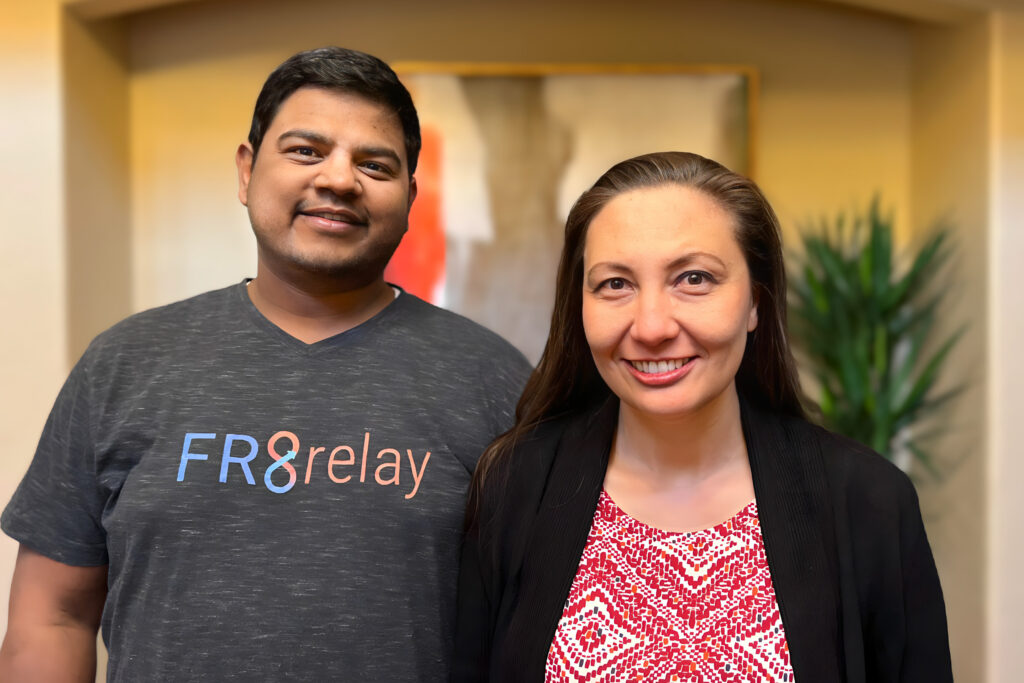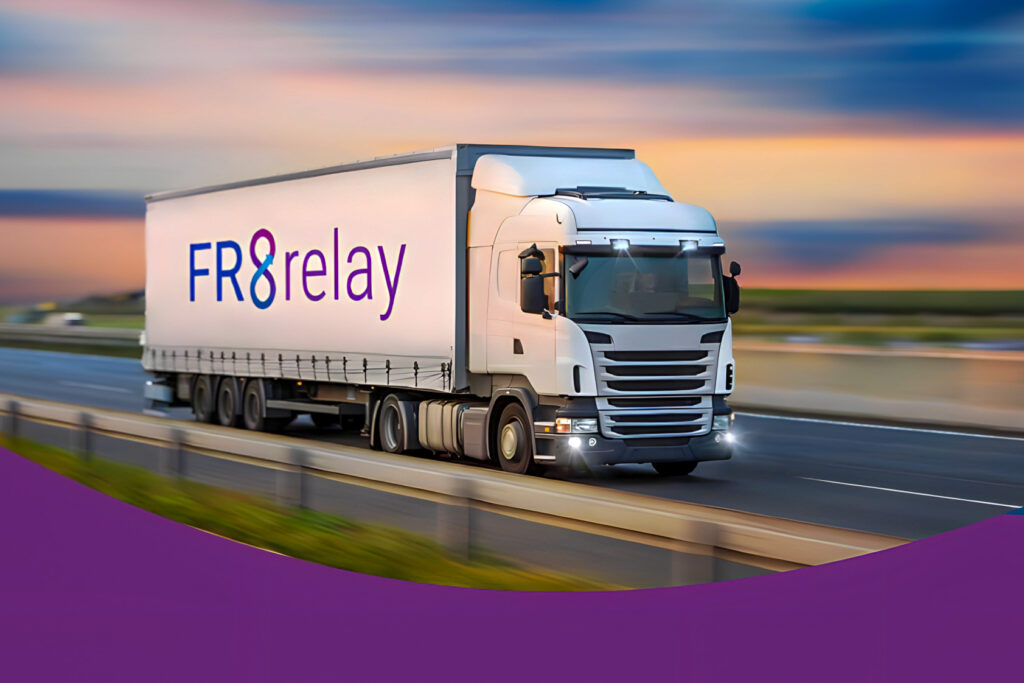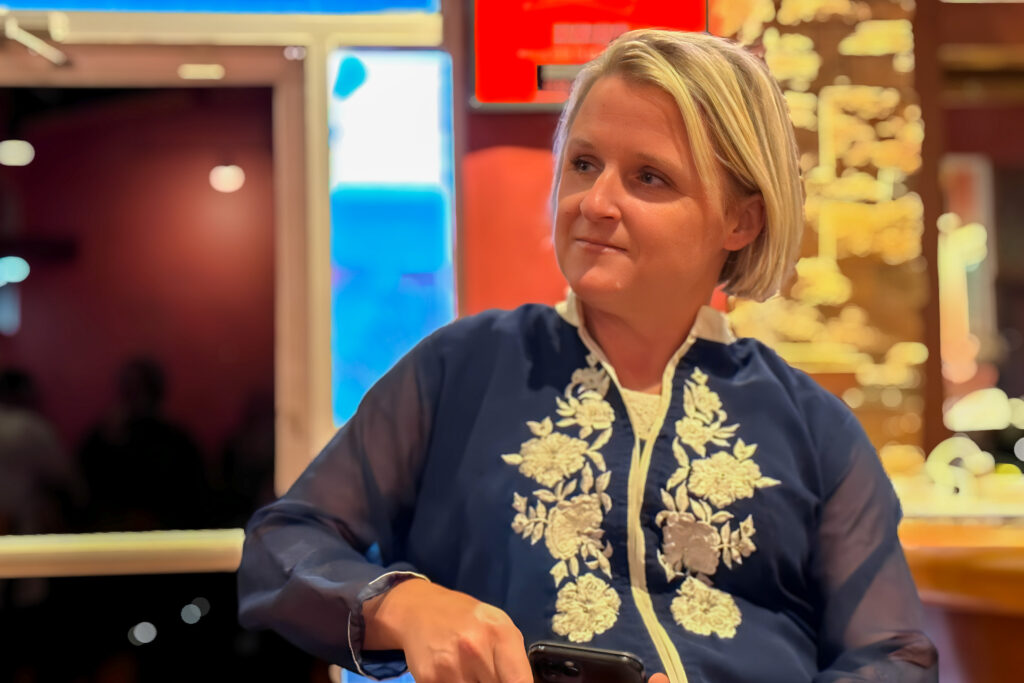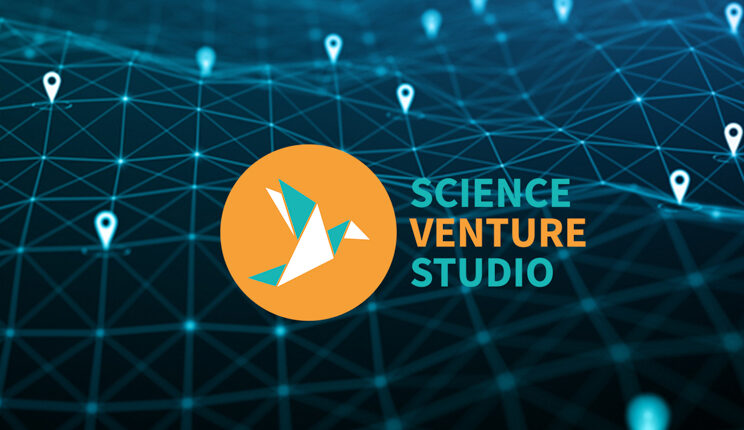Winrock International and the Walton Family Foundation support for science-tech startups in the U.S.

Aayush Thakur, founder of FR8relay, and Deme Yuan, chief operating officer for FR8relay. Photo: FR8relay.
When you drive on the U.S. interstate, you’ll likely spot signs on the semi-trucks promoting hire-on bonuses and career opportunities available as a truck driver. It’s no secret: the trucking industry is known for high employee turnover rates due to long hours and extended time away from family. However, with support from a Winrock-led science and tech enterprise project funded by the Walton Family Foundation, a Bentonville, Arkansas-based startup called FR8relay is developing an innovative software solution to streamline shipping and improve drivers’ routes.
Currently, truckers often drive for weeks at a time, spending a maximum of 11 hours per day on the road. The remaining 13 hours must be spent taking breaks, parking and resting after a long day (or night). FR8relay’s software enables drivers to maximize their 11-hour driving limit effectively by matching up trucks and drivers to keep cargo moving. One driver can travel approximately five and a half hours toward their destination and then switch trailers with another driver who is already headed in the direction of the drop-off to get home. This allows both drivers to drop off the cargo while still getting home on time.

This advancement could increase the availability of drivers to deliver cargo more efficiently while also offering them greater flexibility and the opportunity to be home every night. FR8relay is a participating client in the Winrock-led Science Venture Studio, a project that supports Arkansas-based science and technology startup enterprises through the complex processes involved in applying for and securing non-dilutive grant funding to develop emerging technologies and grow their companies. The SVS project launched in 2020 as a collaborative initiative among entrepreneurial support organizations in Arkansas.
“Non-dilutive federal grant programs, like the Small Business Innovation Research and Small Business Technology Transfer awards, provide critical support for deep-tech startups,” says Katie Thompson, a Winrock senior program officer and the executive director of SVS. “Unlike non-technology startups, deep-tech businesses often require extensive research and development to bridge the gap between basic research and commercialization.”
David Sanders, director of enterprise ecosystems at Winrock, adds: “The Science Venture Studio champions applied research by commercializing technology through local startup company building rather than simply licensing intellectual property. This approach directly benefits our local economy by transforming scientific innovations into sustainable, community-driven companies.”
Non-dilutive funding is a form of financial support that allows the company to conduct necessary research and development of their technology while keeping full ownership of their company. That’s a game-changer for companies like FR8relay, which, with SVS support, has applied and secured funding to move their technology from proof-of-concept to a commercialized product with federal agencies such as the National Science Foundation, the U.S. Department of Energy or the U.S. Department of Agriculture. Winning these kinds of awards means companies can continue moving forward quickly with the funding they need to further develop their concepts and technologies.
Supporting tech startups in a rural state like Arkansas through projects like SVS also has benefits for both the state and regional economy, workforce development, community growth and innovation. Small businesses, particularly tech startups, are major job creators for high-skilled occupations and play a critical role in stimulating economic activity. When businesses thrive, they generate income for employees and owners, which gets reinvested into the local economy, boosting other sectors like retail, real estate and services. Support for tech-focused businesses helps to diversify Arkansas’s economy from traditional sectors to buffer against economic downturns, contributing to economic resilience.
Thompson says securing capital through non-dilutive funding requires a holistic approach that includes identifying potential partners, strategic planning, innovative technology development and effective storytelling. Communicating a company’s story and technology development plan so others can understand what they do and how they do it involves intense collaboration, immersive planning and attention to detail.
“SVS has worked to address the unique challenges of translational research and technology commercialization in Northwest Arkansas by providing in-the-trenches support for startups that are at a critical but often underfunded stage of development,” Thompson says. “We recognize that each company is unique and offers flexible support tailored to meet your specific needs.”
On average, a client collaborating with SVS submits nearly four proposals after initial engagement, indicating value validation and high satisfaction. Furthermore, SVS continues to expand its network and community imprint with technology mentors who are successfully leading companies that are supported by non-dilutive research funding. Examples include Ozark Integrated Circuits, a company that produces electronics that can withstand high heat; SFC Fluidics, a biotech company working to improve diabetes care; Vitruvian Matrix, a startup focused on using therapeutic cells to treat cancer; and ProPika, which specializes in converting agricultural waste to produce biofuels.
SVS’s startup formula is working. To date, the project has helped reel in total grant funding of nearly $11 million for 15 groundbreaking tech companies based in Arkansas. From 2022-2024 alone, SVS helped companies pull in nearly $6.5 million – a whopping 60% success rate when comparing applications submitted to grants awarded.

SVS is successfully bridging the gap that once caused Arkansas to fall short in capturing federal funds and resources available to support entrepreneurs, according to Sanders.
The work is continuing apace. As of late 2024, three Northwest Arkansas science and tech companies, all SVS clients, were preparing proposals with a combined funding request of more than $6.2 million, further demonstrating the significant potential for continued evolution of innovative tech startups in the region.
“Our success is best demonstrated by our clients’ success,” Thompson says. “FR8relay has shown significant progress to the point where their reliance on our program has diminished, highlighting the program’s success in building capacity and confidence among clients. Another notable success is the relocation of companies to the Northwest Arkansas region. Over two years, four new companies have relocated to the Northwest Arkansas region citing our support as a major consideration in their relocation decision.”
What’s next for SVS?
Thompson says the project’s achievements led Walton Family Foundation to award a new, two-year grant to continue programming in support of tech startups until 2026. “We are excited to continue this impactful work that benefits companies, the region and the state.”
Related Projects

